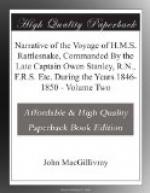We started at daylight, although it was raining, and continued to do so all day; about six o’clock in the evening we reached a small river, running rapidly over rocks, and deep in some places. Its course was north-easterly, but it turned north, a little below where we first came upon it. We camped by the side of it, it being too late to cross, although there was open forest ground on the other side. The open ground on the coast side of the range was considerably lower than that on the other, the highest part of our track being, according to Mr. Kennedy’s barometrical observations, upwards of two thousand feet above the level of the sea. The soil was a strong loam of a dark colour, owing to the admixture of a great deal of decomposed vegetable matter; rock projected in many places, and in those parts where the rocks were near the surface, Callitris (cypress pine) grew. In the deeper soil were large trees of the genera Castanospermum, Lophostemon, and Cedrela, mingled with Achras australis, Calamus (climbing palm), Seaforthia, Dicksonia, Osmunda, large shrubs of Alyxia; several very interesting Orchideae were also found in this place. We also discovered a great many snails, with very large shells of a greyish colour. One I found on the bushes with an operculum—this I gave to Wall.
August 10.
This morning we took the sheep and horses to a spot in the river where the current was not so strong, and drove them across. The sheep followed the horses like dogs. We then cut down three small straight trees, and made a bridge across a deep channel which ran between two rocks which projected out of the water, across which we carried our stores on our backs. All the things were got over before dark, after which we made a large fire to dry ourselves, having been wet to the waist all day. Niblett, who had been very unwell for three or four days, was taken much worse to-day. The position of our camp here was about 17 degrees 48 minutes South latitude, 145 degrees 20 minutes East longitude. We this day crossed the range, and prepared to commence our journey on the other side.
August 11.
We remained this day at the camp to give the horses a rest after their harrassing journey over the range.
August 12.
Proceeding about five miles over uneven open forest ground, with isolated blocks of rock, we camped by a chain of rocky waterholes. The trees growing here were casuarina, box, apple-gum, and ironbark.
August 13.
Sunday. Prayers as usual at eleven o’clock.
August 14.
Complaint was made to Mr. Kennedy of the waste and extravagant use of the flour and sugar by Niblett, who had the charge of the stores. Mr. Kennedy immediately proceeded to examine the remainder of the stores, when he found that Niblett had been making false returns of the stores issued weekly. Up to this time Mr. Kennedy, Niblett, and Douglas (who waited on Mr. Kennedy) had messed together, apart from the other ten. Niblett took charge of the ration for the smaller mess, and usually cooked it himself, the ration being taken out weekly from that weighed for the whole party. Besides issuing a larger ration to his own mess, Niblett had taken a great deal from the stores for himself.




